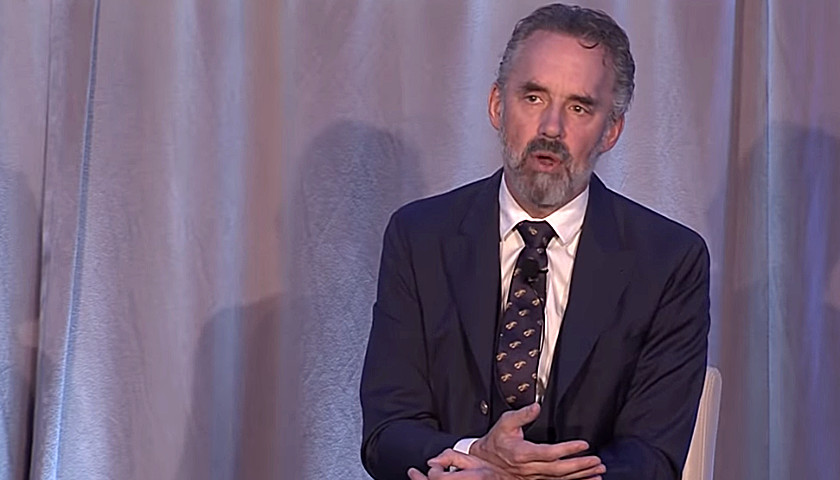by Jarret Stepman
President Donald Trump exclaimed in his State of the Union address that America would “never” be a socialist country.
Yet multiple polls suggest that many Americans, especially younger ones, embrace left-wing ideology in increasing numbers, as more politicians have openly embraced the term.
Despite ample evidence that socialism has failed to bring prosperity and has actually inflicted widespread misery, why does it resonate? And what can be done to stop its spread?
Jordan Peterson took on those questions at a New York City event on Tuesday hosted by The Heritage Foundation. The Canadian clinical psychologist and author of “12 Rules for Life: An Antidote to Chaos” said the West is undergoing a crisis of spirit and meaning, not poverty.
[ The liberal Left continue to push their radical agenda against American values. The good news is there is a solution. Find out more ]
Peterson explained why he thinks socialism resonates with younger Americans in particular.
“People are unbelievably ignorant of history,” he said, admitting that even he has gaps in knowledge about history before the 20th century.
But young people are working with even less knowledge, Peterson said.
“What young people know about 20th-century history is nonexistent, especially about the history of the radical left. How would they know?” he asked. “They are never taught about it so why would they be concerned about it?”
For older generations of Americans, Peterson said, things like the fall of the Berlin Wall and the threat of the Soviet Union are vivid memories. But not so for young people who see it as ancient history.
Yet even today, the examples of North Korea and Venezuela serve as clear evidence of socialism’s failure. Yet the left deflects such accusations, chalking those countries up to political corruption and tyranny.
The reason people are open to socialism is that they don’t understand what it really is, Peterson said. They are “emotionally drawn to the ideals of socialism, say, or of the left, because it draws its fundamental motivational source from a kind of primary compassion, and that is always there in human beings,” so the appeal will “never go away.”
The truth is, Peterson explained, the economic strides of recent decades have been astonishing, with poverty falling around the world and massive improvements being made to the material lives of human beings.
But these stories rarely make headlines, Peterson said, in part because it’s hard to keep up with all the rapid changes and innovations, but even more because “human beings are tilted toward negative emotion. … That makes us more captivated by the negative than the positive.”
Adding fuel to this emotional fervor, Peterson said, is a mainstream media “increasingly desperate for attention” in a shrinking market, doing everything it can to attract viewers and listeners.
Worst of all for polarization, Peterson said, is the rise of a “group identity, associated, quasi-Marxist viewpoint with this additional toxic mixture, paradoxical mixture of postmodernism.”
Postmodernism, Peterson said, questions whether large, uniting narratives are valid.
This is a huge problem because human beings are driven by stories and narratives, so this concept is “unbelievably destabilizing for people,” he said.
Life satisfaction comes when we believe we are making our way to a “valid endpoint,” Peterson said, and this mentality isn’t really “optional,” even for nihilists—who deny all meaning in life—because their misery is what gives them meaning.
“The destruction of the narratives that guide us individually, psychologically, and that also unite us, socially, familially … it’s an absolute catastrophe,” Peterson said. And this reality is the result of the “unholy marriage of the postmodern nihilism with this Marxist utopian notion.”
Despite the philosophical incompatibility of these concepts, they have been combined into a potent stew in the late modern age, where group identity is all that matters and individuals are subsumed to the collective.
The intellectual divide between these concepts and classical Western views go “way deeper” than our political divides, Peterson said.
To address the growth of nihilism, it’s important to build the self-worth of individuals so that they can find strength from within, Peterson said. Unfortunately, for half a century, we’ve been teaching people that they are fine just the way they are, he said, but this is a terrible message for those who are “miserable and aimless.”
It is better, he said, to tell people that they are “useless” and ignorant, but that if they actually begin to apply themselves they can become something much greater.
This, rather than platitudes about everyone being perfect, is the path to bringing out the best in people, Peterson said.
– – –
Jarrett Stepman is an editor and commentary writer for The Daily Signal and co-host of “The Right Side of History” podcast.




